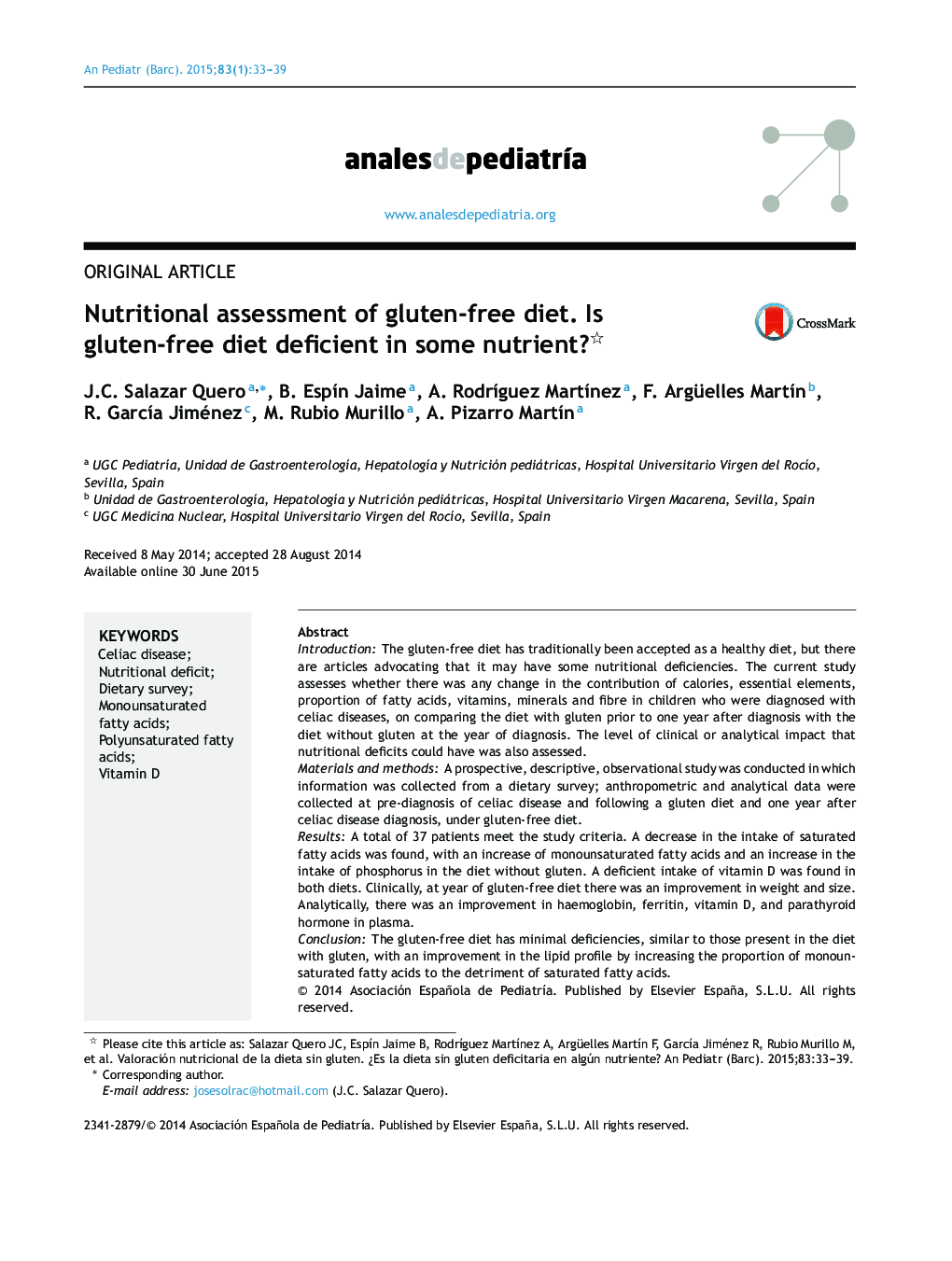| کد مقاله | کد نشریه | سال انتشار | مقاله انگلیسی | نسخه تمام متن |
|---|---|---|---|---|
| 4145138 | 1272589 | 2015 | 7 صفحه PDF | دانلود رایگان |
IntroductionThe gluten-free diet has traditionally been accepted as a healthy diet, but there are articles advocating that it may have some nutritional deficiencies. The current study assesses whether there was any change in the contribution of calories, essential elements, proportion of fatty acids, vitamins, minerals and fibre in children who were diagnosed with celiac diseases, on comparing the diet with gluten prior to one year after diagnosis with the diet without gluten at the year of diagnosis. The level of clinical or analytical impact that nutritional deficits could have was also assessed.Materials and methodsA prospective, descriptive, observational study was conducted in which information was collected from a dietary survey; anthropometric and analytical data were collected at pre-diagnosis of celiac disease and following a gluten diet and one year after celiac disease diagnosis, under gluten-free diet.ResultsA total of 37 patients meet the study criteria. A decrease in the intake of saturated fatty acids was found, with an increase of monounsaturated fatty acids and an increase in the intake of phosphorus in the diet without gluten. A deficient intake of vitamin D was found in both diets. Clinically, at year of gluten-free diet there was an improvement in weight and size. Analytically, there was an improvement in haemoglobin, ferritin, vitamin D, and parathyroid hormone in plasma.ConclusionThe gluten-free diet has minimal deficiencies, similar to those present in the diet with gluten, with an improvement in the lipid profile by increasing the proportion of monounsaturated fatty acids to the detriment of saturated fatty acids.
ResumenIntroducciónClásicamente, se ha presentado la dieta sin gluten como una dieta sana, pero existen artículos que defienden que puede presentar algunas deficiencias nutricionales. En el presente estudio se valoró si existía algún cambio en los aportes de calorías, principios inmediatos, proporción de ácidos grasos, vitaminas, minerales y fibra en los niños que eran diagnosticados de celiaquía, comparando la dieta con gluten previa al diagnóstico con la dieta al año del diagnóstico sin gluten. También se valoró el grado de repercusión clínico o analítico que podrían tener los déficits nutricionales.Material y métodosEstudio observacional, descriptivo y prospectivo en el cual se recogieron los datos de encuesta dietéticas, antropometría y analítica previas al diagnóstico de celiaquía siguiendo dieta con gluten y al año del diagnóstico, con dieta sin gluten de los pacientes diagnosticados de enfermedad celíaca.ResultadosTreinta y siete pacientes reúnen criterios de estudio. Se encontró una disminución en la ingesta de ácidos grasos saturados, con un aumento de monoinsaturados, un aumento en la ingesta de fósforo en la dieta sin gluten y un ingesta deficitaria de vitamina D en ambas dietas. Clínicamente, al año de dieta sin gluten hay mejoría en el peso y la talla. Analíticamente, hay mejoría en las cifras de hemoglobina, ferritina, vitamina D y parathormona plasmáticos.ConclusiónLa dieta sin gluten presenta mínimas deficiencias, similares a las presentes en la dieta con gluten, con una mejoría en el perfil lipídico, aumentando la proporción de ácidos grasos monoinsaturados en detrimento de los ácidos grasos saturados.
Journal: Anales de Pediatría (English Edition) - Volume 83, Issue 1, July 2015, Pages 33–39
